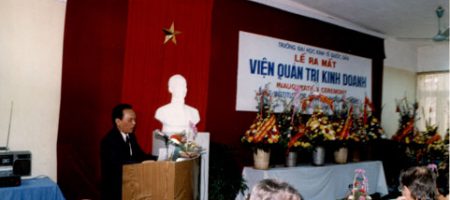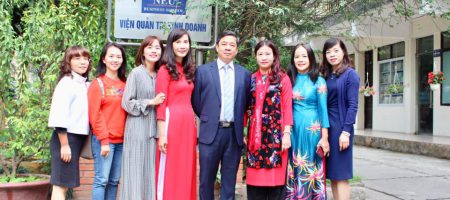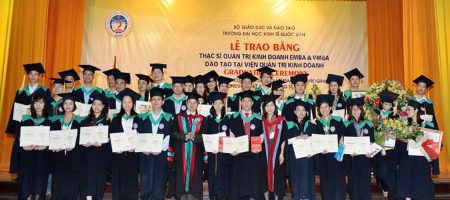Reporters: In the next five-year development plan, the National Economics University make an orientation to become ‘’a great university’’. “In the structure, there will be at least three member schools, the School of Economics, the School of Business and the School of Science and Technology”, shared by Assoc.Prof. Dr. Pham Hong Chuong, the President of the National Economics University about the implementation of university autonomy and the roadmap to become a multidisciplinary university in the coming time.
The School Council completion plan in the first quarter of 2021
Reporter: The National Economics University is one of the institutions that is piloting the abolition of the governing body, which advantages and disadvantages has the university had during this 5-year pilot implementation?
Assoc.Prof.Dr Pham Hong Chuong: National Economics University was assigned to implement a pilot project to renovate operating mechanism towards autonomy and self-responsibility under Decision No. 368 / QD-TTg dated March 17 2015 and Resolution No. 117 / NQ-CP dated November 9, 2017 of the Government regular meeting in October 2017 and is one of the three higher education institutions piloting high autonomy under the Resolution. No. 39 / NQ-CP dated June 11, 2019 of the Government regular meeting in May 2019. After 5 years of implementing the autonomy mechanism, the National Economics University has recorded important results.
Flexibility has been strongly promoted in most aspects of the school’s activities. Many new training programs have been opened to meet the requirements of the country’s socio-economic development in the context of the industrial revolution such as Digital Business, Financial Technology, Data Science …
Training content and methods have made progress in line with the digital transformation trend. Blending learning with teaching is the dominant method. The quality of training has made a remarkable improvement. The school pays special attention to the development of training programs in English, Advanced Program (CTTT), High Quality (CLC) and Career Orientation (POHE).
The school has actively cooperated training with high-ranked international universities, thereby receiving technology and training programs in the fields which the partner schools have strengths in to meet international integration requirements of the country.
The university has taken advantage of its strengths and exploited opportunities to invest in the development of scientific and technological potentials, perform influential research tasks, thereby asserting its role and position.
The autonomy mechanism does not create many differences in the rights and responsibilities of the university in science and technology activities. The spirit of autonomy has been strongly communicated to lecturers and researchers and has fostered research force’s capacity and exploited research opportunities, thereby creating an active position in exploiting and implementing science and technology activities. . The school is active in using properties, purchasing equipment, investing, and upgrading facilities for training and scientific research.
In the process of implementing autonomy, besides the successes and advantages, the university has still faced many difficulties mainly because the current legal document system is not uniform and has many points that are not really clear and unified. The implementation of a new high-level autonomy mechanism has just been implemented, so it has not yet been able to achieve specific results.
Reporter: One of the prerequisites for schools to implement their autonomy is to establish and consolidate the School Council in accordance with the provisions of Law No. 34 and Decree 99. It is not only a requirement to comply with the law, but also the necessary cognitive and thinking innovation in university governance according to the advanced paradigm. How does the National Economics University consolidate the school council according to the new regulations?
Assoc.Prof.Dr Pham Hong Chuong: Due to the objective and subjective factors, the University is amending the regulation on organization and operation, which stipulates the establishment of the NEU Council.

Reporter: With comprehensive autonomy, does the school change to a multidisciplinary university and how specifically?
Assoc.Prof.Dr. Pham Hong Chuong: Before exercising autonomy, National Economics University had multi-disciplinary training. At present, the trend of multidisciplinary development is further strengthened
In the next five-year development plan, The National Economics University is about to establish more three member schools: the School of Economics, the School of Business and the School of Science and Technology. The basic orientation of the School of Science and Technology is research and training on digital transformation, the application of artificial intelligence in economics, business and management.
Continue to implement three methods of enrollment in 2021
Reporter: When you become “National Economics University”, will the method of admission to the school have changed, sir?
Assoc.Prof.Dr. Pham Hong Chuong : Specifically, in 2021, it is expected that the formal university enrollment method of the university will be basically stable as in 2020 with 03 methods: (1) Direct enrollment according to regulations; (2) Admission according to the 2021 high school graduation exam results with the target not lower than 50% and (3) Admission combined with 05 groups of subjects like 2020. Regarding the combination of basic admission as 2020 with 9 combinations (04 codes each).
Aim to enter the top 100 best universities in Asia in the field of economics
Reporter: The National Economics University is a key university and a leader in training high-quality economic human resources of the country. So does the university have a strategy to participate in world university rankings in the coming years? Why?
Assoc.Prof.Dr. Pham Hong Chuong : Today, the ranking process promotes transparency and is the driving force for universities to constantly improve quality, meet the needs of learners, as well as the labor market.
The National Economics University targets one of the top three ranking institutions in the world, including Times Higher Education, the QS (Quacquarelli Symonds) ranking organization, and the Shanghai University rankings.
To access these rankings, the University is implementing synchronous strategic contents, including strengthening research capacity, depth and quality, encouraging and investing in international publications in journals on the list of ISI and Scopus.
Enhance the status of science on the international scale through having the highest number of scientific works per faculty member among economic universities and proximity to major universities in the region.
Select and conduct judging schools and training programs according to international standards. The goal is to make the National Economics University one of the 100 best universities in Asia in the fields of economics, management and business administration.
Reporter: Thank you very much, Assoc.Prof.Dr Pham Hong Chuong!

































